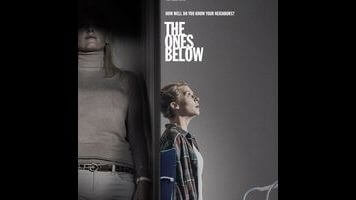“Hi, we’re your creepy new neighbors,” isn’t quite how Theresa (Laura Birn) and Jon (David Morrissey) introduce themselves in The Ones Below, but they might just as well have phrased it that way. From the moment this couple moves into the apartment below Kate (Clémence Poésy) and Justin (Stephen Campbell Moore), they come across as frighteningly intense, especially regarding the subject of children. Both Kate and Theresa are hugely pregnant, but when Kate, over for dinner one night, confesses that she wasn’t sure that she wanted to be a mother until quite recently, both Theresa and Jon react as if she’d just admitted to molesting all of her nieces and nephews. So over-the-top is their stunned horror that it’s not hard to guess where the story will go when Theresa subsequently loses her baby (after falling down the stairs, perhaps in part because Kate and Justin neglected to replace a lightbulb in the hall). Would you let this hyper-maternal, grief-stricken woman babysit your newborn? No parent is that exhausted.
Written and directed by David Farr, making his feature debut (his other writing credits include Hanna and the recent miniseries The Night Manager), The Ones Below is a thriller that exasperates more than it thrills. For one thing, the cast isn’t up to the challenge: Poésy (best known as Fleur Delacour in the Harry Potter films) fails to create the emotionally complex character Kate needs to be in order for one switcheroo to work, and her costars are either overly emphatic (Morrissey’s quite the shouter) or terminally bland. Nor does Farr demonstrate much facility with building suspense. Many of his shots employ visual syntax that cue the viewer to read them as ominous, but nonetheless seem benign; holding on the image of a lawn sprinkler for no apparent reason does not, in itself, make the lawn sprinkler threatening or unnerving. Such touches might have been more effective had the downstairs neighbors come across as faintly unusual rather than as certifiable lunatics who’ll clearly do anything to be parents.
Constantly underlining the blatantly obvious (“Hmm, wonder why we keep seeing our heroes bring in milk bottles from the doorstep?”) is bad enough, but The Ones Below compounds the problem by revealing its ostensible secrets slooooooowly, with unearned confidence that nobody could possibly see them coming. Even when Farr succeeds in constructing a plausible red herring—yes, Kate’s strained relationship with her mother (Deborah Findlay), plus hints of a brother who’s no longer living, will eventually pay off—it winds up undermined by the hindsight realization that one step in the master plan makes zero sense except as a ploy to mislead the audience (as opposed to misleading any of the characters on screen). Consequently, watching the film is a bit like walking into your house on your birthday, seeing two dozen people crouched behind furniture waiting to jump out and yell “Surprise!”…and then waiting and waiting and waiting for that to happen, while whoever brought you there continues the ruse, making awkward small talk. At a certain point, it’s hard not to just yell “I know! I know! Let’s get this over with already.”









































